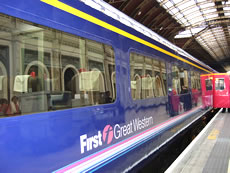First Great Western to Compensate Regular Commuters
Survey puts them at bottom of customer satisfaction league
London TravelWatch, the watchdog for transport users in and around London, welcomed the announcement from First Great Western (FGW) that it will double the compensation paid to its regular commuters and other passengers suffering delays.
The announcement of fare discounts comes in the same week as FGW came bottom of a passenger satisfaction league table.
Brian Cooke, Chairman, London TravelWatch said of the compensation package: “This is a very welcome move by FGW and shows that it has listened to the concerns that London TravelWatch and others have had about the very poor performance over recent months. We were very critical of the price increases that FGW imposed on its season ticket holders in the Thames Valley area earlier this month, and this announcement means that the discount that regular season ticket holders will now receive at renewal means that, in most cases, a decrease in real terms.
Under FGW’s customer charter passengers in the London and Thames Valley area (including Ealing, Acton, Southall, Slough, Maidenhead, Windsor and lines to Oxford) have been receiving a five per cent discount on monthly and longer season tickets. This is because the punctuality of their trains is way below the agreed target of 92% of peak time trains arriving with five minutes of the scheduled time; in the year to 5 January 2008 only 73% of trains met this target. Other customers can claim compensation for delays of over 30 minutes. The discount for season ticket holders will now be doubled to ten per cent, and the compensation to other ticket holders for delays in excess of half an hour will also be doubled.
Brian Cooke continued: “While we know that passengers would prefer their trains ran on time, we also know that if they do not then realistic compensation is appreciated. These new level of compensation is a much closer recognition of the poor service that customers in the Thames Valley have been experiencing, We hope that both FGW and Network Rail will work extra hard to ensure that the performance on the route improves to the point that there will no longer any need to talk about compensation for poor service.”
London TravelWatch also welcomed the announcement that FGW would be freezing fares and car park charges for at least 12 months.
“This is again a step that shows that FGW’s management are listening to customers and ensures the discount package can not be negated.”
Since the FGW franchise began in April 2006, London TravelWatch has been concerned about the poor performance and has been critical of both Network Rail and First Great Western for this.
Brian Cooke concluded: “We believe that the recent changes in the management structure at both Network Rail and First Great Western will mean a much greater concentration of management time on the performance in the area. The real answer is to radically improve performance which passengers want more than compensation. Other parts of the country shown it can be done and we hope to see results improve radically in the Thames Valley. We also believe both Network Rail and FGW should consider greater and quicker investment to help further improvements. In particular we believe that the more rolling stock is needed in order to lengthen some trains to relieve overcrowding. We hope the government will also play their part in trying to make this happen.”
Certainly, it is to be hoped that things will improve after a recent Independent rail consumer watchdog Passenger Focus which sampled 50,000 people in its National Passenger Survey.
Only 74% of the Swindon-based firm's passengers were satisfied with their journeys - the national average is 81%.
Peter Andrews, from the campaign group, More Train Less Strain, said: "I'm not at all surprised. This is why our fare strike on Monday will be going ahead."
Next week's proposed action follows repeated criticism against the firm for poor service, delays and overcrowding.
The survey also found that fewer than half of FGW's passengers were happy with the price of tickets, the ability of the company to deal with delays, and the state of the toilets.
The company has blamed a shortage of rolling stock and staff.
"We've been getting the same apologies for a year, but their profits continue to go up," said Mr Andrews.
"They're more interested in giving their shareholders a large return, rather than providing the public with a punctual, affordable and reliable railway."
He said the planned fare strike on 28 January had received widespread support .
January 24, 2008
